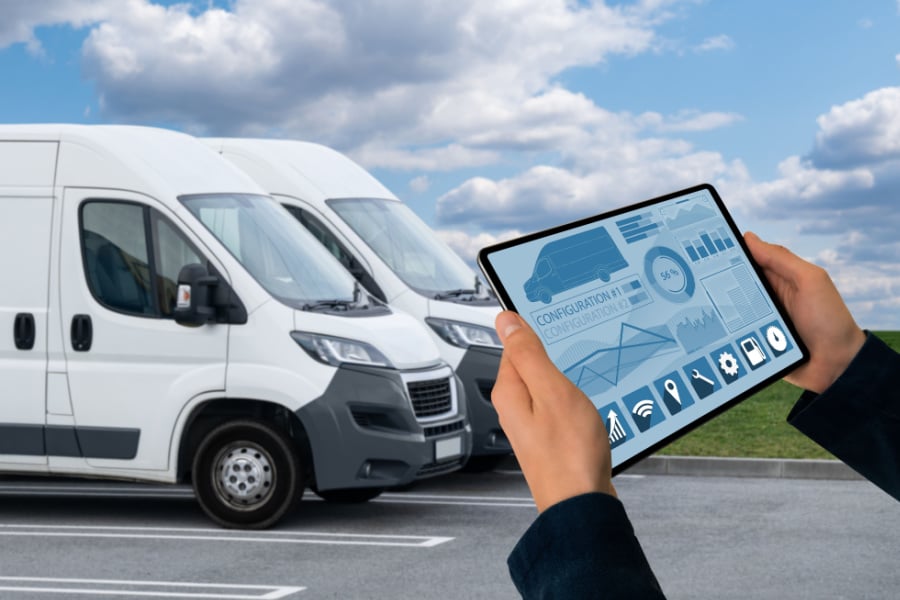Industries
Technology & Innovations
Semi Trucks
Logistics
Lease & Maintenance
Buy Used Trucks

The transportation industry relies on all types of vehicles to haul freight and keep supply chains moving with little to no disruption. From planes that fly cargo across the world to sprinter vans that move food and beverage products across town, logistics is constantly in motion and requires equipment to be working at peak performance. Commercial trucks are a big part of this, with more than 72% of goods that are consumed traveling on trucks. That’s why commercial truck maintenance is a top priority for truck leasing and rental companies such as Ryder.
The landscape of truck maintenance has undergone numerous changes over the years. In the past, roadblocks in communication caused a significant amount of downtime for drivers on the road as they were left waiting on a mechanic with little to no information on changes in ETA. Fortunately, the transformative impact of technology has created opportunities for evolving processes. In this article, we’ll look at the tech-driven future of truck maintenance and how it serves drivers, third-party logistics (3PL) providers, and other areas of the transportation industry.
Commercial Truck Connectivity to Service Locations
As a truck driver, experiencing issues that affect the safety of you, other drivers, and your cargo is stressful and must be addressed immediately to avoid danger or costly downtime. Depending on the severity of your situation, you can either find a mechanic or request one out to your location. But the Internet of Things (IoT) has helped develop more accurate, efficient devices for commercial trucks to stay connected to telematics software. That means vehicles can be monitored via satellite tracking through mobile apps or GPS technology, and this allows for real-time data transmission to assist with remote diagnostics and monitoring. Additionally, this makes it easier for drivers to find the closest service locations and provides three benefits of connectivity:
Technology Inside the Repair Shop
Many repair shops have adopted new technology to ensure mechanics complete their jobs to the best of their ability. This may include optimized software, diagnostic tools such as OBD2 scanners, or equipment that is used for specific tasks. For some maintenance shops, such as Ryder service locations, more advanced, augmented reality (AR) applications are utilized for troubleshooting to offer preventive maintenance to commercial trucks.
Data analytics have also been helpful for body shop management, because they provide a plethora of information that can assist with:
Lastly, wearable devices have been the latest breakthrough in technology to streamline maintenance processes for technicians. For example, smart glasses offer remote expert assistance with hands-free access to repair instructions. Workflow can be further optimized with IoT-enabled wearable sensors that monitor technician health and safety on the job.
Technology-Led Truck Maintenance Training
One of the top priorities involved with commercial truck maintenance is training fleet managers with technology-led programs. With the rise in virtual reality (VR) and augmented reality (AR), new training modules are centered around both concepts to showcase more efficient methods to repair commercial vehicles. This allows for more hands-on practice in a virtual environment for an enhanced learning experience that simultaneously reduces the amount of dangerous and costly mistakes on the job. And, for individuals that want to get their start in the transportation and logistics industries, accessible training materials are available for online certification programs. These can even be used as continuous learning opportunities for technicians.
New technology platforms have been made user-friendly, accessible, and taught to fleet managers to accelerate productivity. Apps with vehicle service history tracking show maintenance records and vehicle health data, allowing experts to make decisions based on data. Fleet management digital platforms simplify scheduling and maintenance planning, and can also have the capability to display digital vehicle inspection reports (eDVIRs).
Future Trends in Commercial Truck Maintenance
When looking at the state of the transportation industry, there are still various ways to further optimize commercial truck maintenance. In an effort to cut back on emissions, more companies will likely adopt sustainable and eco-friendly maintenance practices in the near future. New autonomous vehicles are also being introduced to the market, meaning maintenance will be quite different from traditional service from a mechanic. And, with the rise of artificial intelligence in technology, one trend we see on the horizon is AI-driven predictive maintenance.
Working with 3PLs
As a third-party logistics provider, Ryder is committed to revolutionizing commercial truck maintenance with industry expertise and experience. Our nationwide network of service locations provides immediate coverage for drivers in need of repair. Plus, our own RyderGyde™ digital platform contributes to the transportation industry by giving fleet owners, managers, and drivers accessibility to rent vehicles, compare fuel rates, manage vehicles, and more.
By partnering with Ryder, you can take the stress out of fleet management through the following benefits:
Preparing for the Future of Commercial Truck Maintenance
From advanced technology being implemented in repair shops to more involved training curriculums for specialists, the landscape of commercial truck maintenance will continue to evolve over the years. It’s imperative for experts to embrace tech for full efficiency and stay one step ahead of the competition. By allowing this integration of state-of-the-art equipment or in-depth programs, companies across the country can benefit from better scheduling, higher customer satisfaction, and repairing trucks for maximum safety and reliability on the road.